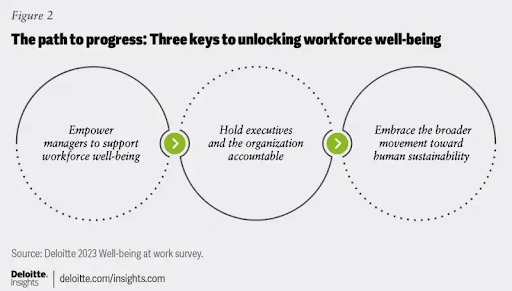Would you be surprised to know that half of your workforce wasn’t doing well mentally? Deloitte’s 2023 workplace survey found that 60% of employees, 64% of managers, and a shocking 73% of executives are ready to find a new position.
Stress, burnout, and financial burdens are real-life obstacles standing squarely in the way of your employees’ productivity.
While total reward and wellness programs in the workplace have received attention in recent years, it was the COVID-19 pandemic that brought the conversation out into the light. This prompted employers to seek out new options to help retain and empower their employees.
One such option is employee financial wellness benefits or programs – which is what we will be covering in this article. Read on to learn how important these benefits are for your frontline workers!
The Real Value of Employee Wellness Programs
The low state of employees’ mental and physical well-being should be especially concerning for leaders. Many workers say they frequently feel negative emotions and fatigue. For example, around 52% of workers “always” or “often” feel exhausted.

With that in mind, it’s no surprise that 87% of job seekers consider wellness program benefits when accepting a job offer. They’re interested in perks like:
- Flexible pay
- Financial literacy
- Spendable incentives for fitness, participation, etc.
- Personal finance advisory
- Bonuses and monetary rewards
- Healthcare incentives that translate to spendable rewards
An increasing number of employers are willing to meet these needs in favor of building a culture of caring that helps the organization achieve its larger business goals. In a Zippia survey, they found that the average return on investment (ROI) for these employee benefits financial wellness programs is six-to-one.
And that’s just in direct measurables. The full extent of how these programs support a business through human capital investments is more difficult to measure.
Connecting Financial Wellness and Employee Loyalty
While financial struggles are individual, employees facing these burdens are often less attentive and less productive than their peers. This translates to:
- More workplace accidents
- More frequent absences
- More errors at work
- More time to complete tasks
Here’s a look at why. In a PwC survey on employee financial wellness, 56% of respondents reported that financial stress disrupted their sleep. Fifty-five percent reported an impact on mental health, 50% on self-esteem, and 44% on physical health.
While the direct benefits of financial wellness programs can be easier to attribute and measure, the indirect benefits, like happier employees, that are able to engage, connect, and overall get more work done have a greater impact on a company’s bottom line.
When you look at the correlation between financial wellness employee benefits and productivity, the return on investment is easy to see. For example, Starbucks offers its employees a variety of financial wellness benefits like:
- College achievement plan for tuition assistance
- Bean Stock company investment vehicle
- Self-Service financial tools and coaching
As a result of these initiatives, Starbucks, which operates in the high-turnover food service industry, has been able to attract and retain baristas at higher rates.
How Can Employers Implement Effective Financial Wellness Benefits?
There’s no one-size-fits-all approach to employee perk and benefit programs. What works can be highly dependent on the needs of the workforce and the culture of the company. For example, frontline employees working two or more jobs don’t have time to attend in-person classes on their day off.
Meanwhile, employees without those demands on their time might be willing to travel to a campus to attend classes to get new certifications. So, first and foremost, employers should begin by surveying their actual employees to discover what is important to them and what obstacles are in their way.
Equipped with this information, employers can begin finding solutions that will meet the needs of their workers and integrate it with their current process. For example, food service is a traditionally high-turnover industry. Yet, Costco has found the right balance with a series of asynchronous learning modules to allow its employees to learn and grow.
Other companies, like American Family Insurance and Aetna, offer student loan repayment employee benefits, helping ease the burden of employees who are struggling with student debt. While these headline-grabbing moves are effective in attracting and retaining employees, businesses don’t have to roll out huge, expensive programs to get on board.
In fact, a growing number of FinTech companies are making financial wellness perks easier to administer than ever before. For example, imagine Earned Wage Advance programs putting pay in people’s hands faster to relieve financial stress. Or offering benefits with zero cost to you that can improve employee well-being – like extended warranty coverage on items they purchase and cellular device protection.
FinTech Bridges the Gap Between Benefits and Loyalty
Dozens of polls and surveys conducted by reputable companies show that employees want help with their financial health. According to PwC, which has been conducting financial wellness surveys for employees since 2012, a record 68% of employees are now participating in workforce programs.
The positive effects of these programs are transforming what it means to be productive in the workplace. Workplace accidents occur less frequently, insurance premiums trend down, mistakes are less common, and employees are more productive.
Behind the trend of financial wellness employee benefits is a growing number of FinTech options that are quietly revolutionizing how companies compensate employees. There are solutions that are changing the way companies process payroll, solutions that make it easier to transfer money, and solutions that automate employee benefits within financial wellness.
Not sure where to start looking? Juice Financial is a modern FinTech provider that offers flexible solutions that work with your financial wellness programs. We deliver perks like earned wage advance through programs like payment cards, or rewards cards to incentivize and reimburse employees.
Learn more about how you can use Juice Financial to transform your workforce today!